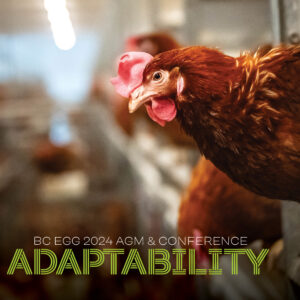Think Eggs
Eggnog Christmas Countdown
This year we’re celebrating the season with a collection of recipes showcasing our favourite holiday beverage: eggnog! We’ve got over…
By Tim Lambert
A few weeks ago, I wrote an article about why our industry needs 20 years to transition from conventional hen housing. Our friends in Europe and America are experiencing a similar transition. Their cases offer lessons that must inform ours. In that spirit, let’s take a look at both.
In 1999, the European Union passed EU Layer Hen Directive 1999/74/EC. The Directive prohibited investment in conventional housing after 2003, and banned their use after 2012.1
The transition had an enormous effect on egg production and prices. Over a one-year period leading up to the final cut-off date, the number of birds decreased by 33 million. Egg prices shot up, peaking in December 2012.2 After the deadline was met, the flocks increased again, and prices dropped to an unforeseeable minimum. For years, consumers and egg farmers alike faced instability—for the former volatility in egg prices, and for the latter an inability to covering their cost of production.
Uncertainty made things worse. In Germany, a special housing system was developed called a colony nest. There was an assumption that this would become Germany’s mainstay. But a shift in retailer policy led to a decrease in demand for colony nest eggs.3 Investment costs skyrocketed, as many farmers were forced to once again build new barns while still bearing the cost of their first conversion.
While difficult for German farmers—their neighbours had a harder time. The global economic downturn was harsh in Spain and Italy, just as egg farmers in both countries were transitioning. The high investment costs of the transition there were made even harder to bear.
AMERICA: Skyrocketing costs
Over the last several years, commitments to source only “cage-free” eggs have been pouring in from companies across America. United Egg Producers believes that 63.9% of the American laying hen flock will need to be housed in free range or free run systems to satisfy these commitments from their supply chain partners.4 This would represent an enormous transition—today 90% of eggs in the U.S. come from birds in conventional and enriched systems.
It’s a serious financial challenge for American egg farmers. Conventional housing production costs roughly $15 per hen in the U.S. and around $25 per hen in enriched housing. The cost skyrockets to $40 per hen in new “cage-free” systems, on top of the huge initial investment in changing barns and equipment.5
Lessons learned
What are the key takeaways from the American and European experiences?
Certainty is essential: A key problem with the European transition was a lack of certainty around which housing systems would be allowed and which wouldn’t. Many farmers delayed building new barns because of this, impacting the supply of eggs. This led to price volatility with a sudden rise in egg prices followed by a significant drop. We want to avoid these problems by aiming for certainty and orderliness in our approach.
Economic conditions matter: Recessions can put a dent in the best-laid plans—as Spanish and Italian egg farmers know. In many cases, new housing systems require new barns. This is extraordinarily expensive and requires careful planning. A systematic transition in Canada can mitigate investment costs over the long-term, keeping the transition affordable and on-schedule.
We all need to work together: Supply chain partners and farmers have to coordinate and ensure that shifts in production methods are realistic, affordable and workable. Otherwise we will see cracks in the egg market. For that reason, a steady, coordinated and cross-supply chain approach must be executed with the utmost respect for ensuring supply. The goal: To make sure our transition works for farmers, their supply chain partners, and most importantly, Canadian consumers.
See original article here.

This year we’re celebrating the season with a collection of recipes showcasing our favourite holiday beverage: eggnog! We’ve got over…

BC Egg is hosting our 2024 AGM and Conference at the Fairmont Hotel Vancouver. Will you be joining us?

Celebrate World Egg Day with eggs ANY time!